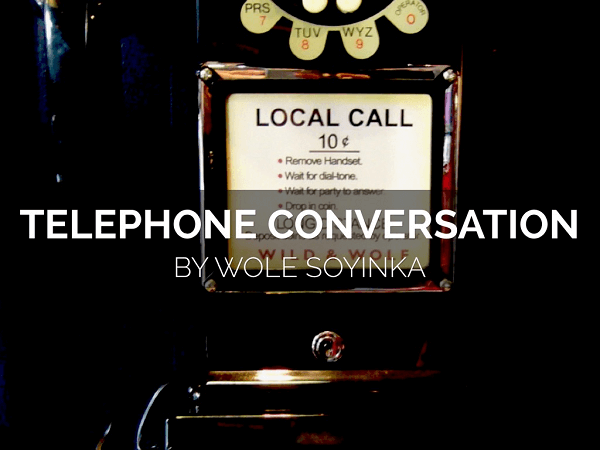Telephone Conversation Poem Summary and AnalysisIn the Wole Soyinka's Telephone Conversation, the poet talks about two persons on the phone, and the tale goes on to tell how the African guy is seeking a house, and the land woman has suggested a high price for it. The poem ends on a good note when the guy realizes his privacy will not be invaded because the landlady does not live on the grounds. The African guy is relieved to hear this, and just before deciding whether or not to accept the offer, he mentions his race. Nothing was quiet on the other end of the queue, which the African guy interprets as an unfriendly refusal gesture. However, the stillness is quickly broken as the landlady begins to talk again, asking him to describe how dark he is. The person initially accepts he misheard the inquiry, yet when the proprietor rehashes it, he understands that she should be aware of this before permitting him to lease her place. 
This sort of thing came out as destroying for the African man, and briefly, he felt nauseated by request and likes himself to be a machine, like a telephone, and that he has been reduced to being a button on the telephone. He could similarly smell the foul from her words and saw red anywhere. The purpose of the telephone call is to show how nasty it may be for a man exposed to racial prejudice. Racism and prejudice are mixed with an ironic aspect that takes over the topic of-telephone conversation. The Afro-American guy is humiliated by the abrupt stillness from the other side, and he enters a state of delusion in which he sarcastically believes that the lady broke her silence and offered him the opportunity to pick and define how dark he is. Like chocolate, dark or light? Then he says that his visa depicts him as - West African Sepia. Not understanding how dark it may be, the lady didn't want to insult the man any further by remaining silent. So she requests that he explain what he implies. The man answers that it is similar to being a brunette, yet all the same, a dim brunette. The man has been clinging to formality, which bursts out when the landlady is inconsiderate. The African man now exclaims loudly that he is black but not so black that anyone should be ashamed of him. He likewise says that the bottoms of his feet and the center of his hand are white, yet he is a nitwit that sits on his back, which has become dark because of rubbing. He realizes the proprietor won't ever be persuaded by his dark tone, and he detects that she could throw down the recipient on him. At such a significant point, he makes a frantic and senseless endeavor to argue for her to come and look hard and long at him, yet he can't help what is going on from deteriorating. At last, the landowner throws down the collector all over. Theme"Telephone Conversation" is a poem that satirizes prejudice. The speaker, who is black, derides a white property manager who won't lease to the speaker except if she knows whether his composition is "dark" or "light." as opposed to the landowner's essential, reductive convictions about race, the speaker says that race and character are complex and diverse. The poem fights that passing judgment on an individual given their skin tone is subsequently stupid, silly, and dehumanizing. The landlord initially seemed willing to lease to the speaker, even "swearing" that "she lived/Off-premises." She cannot detect the speaker's ethnicity over the phone, emphasizing
Be that as it may, when the speaker makes a "self-confession" about being "African," the subject promptly changes to a conversation about complexion. The speaker is satirical in using the term "confession" here, a word generally linked with the reveal of something illegal, to contradict the prejudiced assumption that being "African" is terrible. The speaker realizes how a racist culture unfairly limits black people's housing opportunities. 
To be sure, in light of this "confession," the landowner finds out if the speaker's skin is "light" or dark" ? an inquiry so ridiculous that the speaker momentarily contemplates whether the person has "misheard." The proprietor plays into the oblivious thought that individuals of color with lighter skin (and, this way, whose skin is nearer in appearance to that of white individuals) are better than those with darker skin. The key thing that is important to her, then, at that point, is how dark the speaker looks. Rather than asking what the speaker does expertly, what the speaker's propensities are ?rather than dealing with the speaker like a genuine individual and expected inhabitant ? the landlord diminishes the speaker to a solitary property: skin tone. Prejudice, the poem in this manner clarifies, is innately reductive and dehumanizing. As a result, the speaker declines to respond directly to the landlady's query, instead delivering a series of smart responses that demonstrate the landlady's question as rude and completely irrational. In the speaker's visa, for instance, the person portrays oneself as "West African sepia" (a sort of rosy earthy colored shade found in old monochromatic photographs), a joke that goes directly over the sluggish witted landlord's head; basically, this is like saying, " Well, in a black and white photograph, my skin is grey." The speaker likewise noticed that the human body isn't only one tone: the speaker's face is "brunette," yet the speaker's palms and foot bottoms are "peroxide blonde." The speaker is purposely whimsical in the correlations here, yet the fact is that race and personality are extremely perplexing to be diminished to a straightforward, twofold decision between "dark" or "light," between "Button B" or "Button A." The speaker reprimands the landlord's apparent bias, yet in addition, how she contemplates race. In doing as such, the speaker won't let the proprietor's stupid decision improve the intricacy of human distinction. Regardless of the speaker's imagination, the poem doesn't finish up on a victorious note. As the poem finishes, the landlord will hang up on the speaker, suggesting that, as a white individual, she has the expertise in the public eye to quiet the dark speaker successfully. Analysis of the PoemLines 1-5 The Telephone Conversation in the underlying five lines raises the issue of race. A black man searching for a space for lease tracks down a proposal at a sensible cost in the commercials. He settles on a telephone decision with the property's landlord and admits he is a black man. The initial line shows that the black man knows about the twofold norms. He settles on a telephone decision to affirm that the room is genuinely accessible for a black man. It additionally uncovers that the black man has had severe encounters previously. He probably accepted the 'no distinction' point in the commercials and moved toward the landowners. They ought to have rejected him after realizing he is black. Lines 6-11 These lines in the poem, 'Telephone Conversation,' portray the owner's reaction when she hears the confession. She goes calm when she understands that the speaker is an individual of color. She doesn't uncover her actual aversion and objection to black individuals. The artist says the woman is like the supposed white individuals of good rearing. These individuals call themselves taught and this way nice. They don't stand up against black individuals but keep holding onto racial bias toward them. The black man can generalize the white proprietor by simply hearing her voice via telephone. He envisions her lips painted red with lipstick, and she should be smoking and utilizing a gold-colored cigarette lighter. The artist uncovers that both white and black individuals show bias since they will generally generalize individuals. The landlady is cautious not to use the forbidden term "black." Instead, she asks an oblique question about the level of darkness. To the person of color, it seems as though he is being approached to go with a choice. He contemplates whether he should hit 'Button A' or 'Button B' on the telephone dial cushion, like how he would pick a language over a computerized call. These words of the poem highlight the hypocritical mentality of white people in society. Lines 12-16 The lines in the poem 'Telephone Conversation' describe the black man's reply to the lady's inquiry. He can smell hypocrisy's bad breath. White people conceal their racial discrimination in public but practice it privately. The black man is enraged by the double standard behavior. His eyes are crimson. To him, everything is red: the phone booth, the pillars, and a passing bus. The black guy, on the other hand, believes that the lady should be deemed courteous. She was thoughtful in asking the question. The black guy, on the other hand, views such racial prejudice as oppressive. He likens it to a double-decker omnibus squelching the road's black bitumen. Lines 17-24 These lines in the poetry, 'Telephone Conversation,' illustrate how the black guy describes himself. He professes to be from West Africa. In a way, he is, in like manner, reluctant to utilize "black." He does, however, subtly inform her that he is black. This black man's look outlines how he is reluctant to call himself black, even though he will concede that he is African. He creates the phrasing from his visa as proof and backing. This demonstrates that he is likewise unwilling to embrace his blackness. Numerous painful experiences of racial oppression must have shaped the black guy. Lines 25-30 These lines of the, 'Telephone Conversation', show how the various shades of the black man's tone are being examined. While the black man says he isn't black, the landowner promptly calls Brunet dark. The black man endeavors to get a handle on the fact that the focuses of his hands and the bottoms of his feet are not black. Yet, the proprietor isn't prepared to pay attention to him. The black man thinks of a sorry excuse for sitting for quite a while as the justification for the blackness of his rear. He is even prepared to think of a justification for his black ears. This shows how the black man is wild-eyed to get a space for rent. He is made to apologize for being black. He is compelled to get through the disgrace of his tone. Lines 31-35 The finishing lines of the, Telephone Conversation, depict the land woman's activity and the man's situation. On hearing that the man is black, the woman needs to affirm it. On affirming the man's blackness, the woman hangs the telephone, demonstrating that she isn't prepared to work with a black individual. The black man admits that he is an African, yet he says he isn't black. He portrays how a portion of his body parts are not thoroughly black. As the poem concludes, the black man seems to argue for an opportunity. He requests that the landlord meet him face-to-face before making a choice. Yet, the proprietor declines any further managing the man when she affirms that he is black. |
 For Videos Join Our Youtube Channel: Join Now
For Videos Join Our Youtube Channel: Join Now
Feedback
- Send your Feedback to [email protected]
Help Others, Please Share









